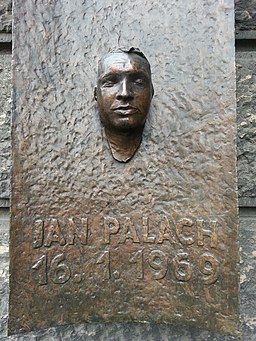On Wednesday the Czechs recognized a new national day - Jan Palach Day. With it they remember the sacrifice of Jan Palach, who on 16th January 1969 set fire to himself in Wenceslas Square. Palach died of his injuries on 19th January.
In an interview with Prague Radio Jaroslava Moserova, the burns expert who tended Jan Palach when he was admitted to hospital, Palach was keen to ensure that the true reason for his self immolation:
"It was not so much in opposition to the Soviet occupation, but the demoralization which was setting in, that people were not only giving up, but giving in. And he wanted to stop that demoralization. I think the people in the street, the multitude of people in the street, silent, with sad eyes, serious faces, which when you looked at those people you understood that everyone understands, all the decent people who were on the verge of making compromises."
The outpouring of national grief at his funeral seemed to indicate that Jan Palach had succeeded at least for a time, however it was not to last at least not publicly. As communism tightened its grip on the country and set out to erase Palach's name from the nation's memory, few people were willing or able to openly defy the authorities. Palach's gravestone was removed from Olsany cemetery, but still people left candles and flowers. In 1973 the body was exhumed and cremated.
Despite all the authorities' efforts Palach remained a symbol in people's hearts. In 1989 on the twentieth anniversary of his death a Jan Palach Week was called by a number of opposition groups including Charter 77. The series of demonstrations that followed between 15th and 20th January were suppressed, but can be said to be the beginning of the Velvet Revolution. Jan Palach's sacrifice at last was having the effect he desired.


